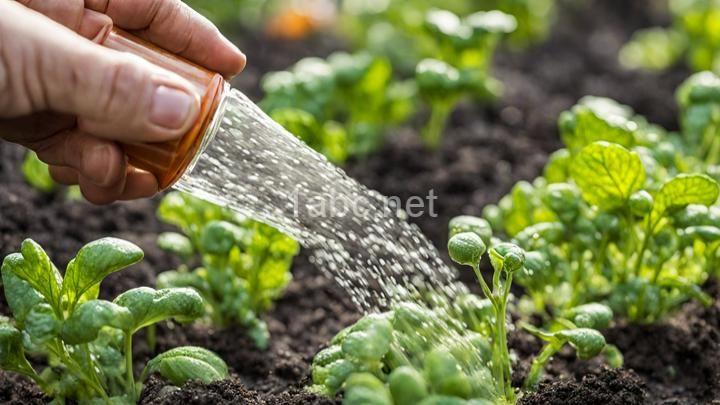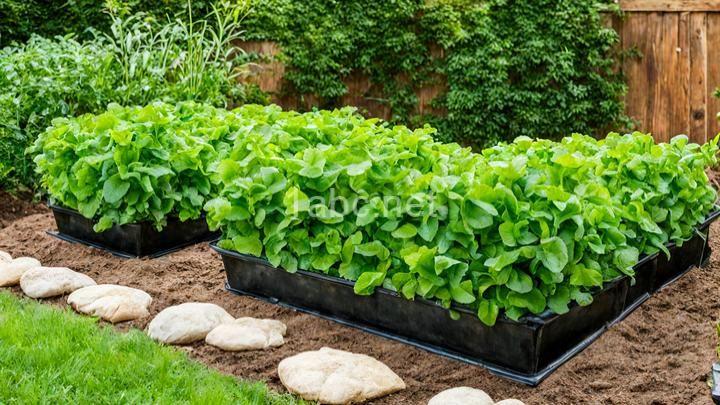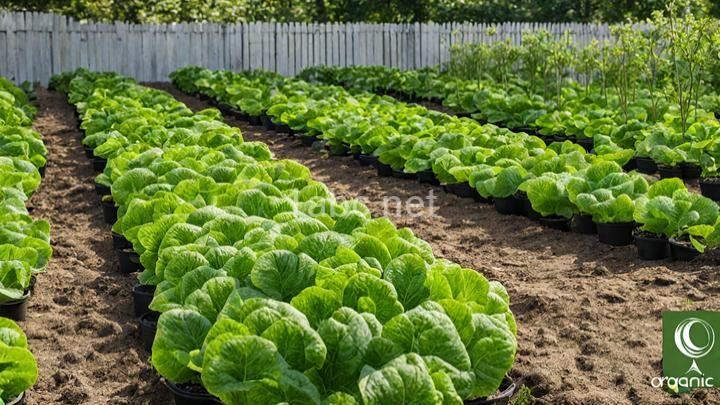Sustainable Watering Techniques for Your Organic Garden

Introduction:
Welcome readers to this blog post where we will explore the world of sustainable watering techniques for your organic garden. In today's world, where environmental conservation is paramount, it is crucial to understand the significance of water conservation in gardening. By implementing sustainable watering practices, not only can we nurture our plants, but we can also contribute to a greener environment.
I. Understanding the Water Needs of Your Plants:
To ensure the health and productivity of your organic garden, it is vital to understand the water requirements of your plants. Overwatering or underwatering can have detrimental effects on their growth. Observing soil moisture levels, plant appearance, and growth patterns are excellent indicators of whether your plants need watering. By familiarizing yourself with these cues, you can avoid wasting water and provide just the right amount your plants need.
II. Mulching for Moisture Retention:
Mulching is a tried and tested method to retain soil moisture and reduce evaporation. The benefits of mulching are numerous, including suppressing weed growth, regulating soil temperature, and improving soil structure. There are several organic mulch materials you can utilize, such as straw, wood chips, or compost. These materials not only help retain moisture but also enrich the soil as they break down over time. When applying mulch, make sure to spread it evenly around your plants, leaving a small space around the stem to prevent rot.
III. Efficient Irrigation Systems:
Efficient irrigation systems are a game-changer when it comes to conserving water in your organic garden. One popular choice is the drip irrigation system, where water is delivered directly to the plant's roots, minimizing water wastage. Soaker hoses are another excellent option, as they slowly release water along their length, allowing for deep watering without excessive runoff. For those looking to make the most of nature's gift, rainwater harvesting techniques, such as rain barrels or rain gardens, can help collect and utilize rainfall efficiently.
IV. Rainwater Collection and Conservation:
Rainwater collection is an essential practice in sustainable gardening. By capturing and utilizing rainwater, we can reduce our reliance on municipal water sources and contribute to water conservation efforts. Setting up a rain barrel system is relatively simple and involves connecting a barrel to your downspout to collect rainwater. This collected water can then be used to water your plants during dry spells. Alternatively, designing rain gardens can help capture and absorb rainwater, replenishing the groundwater and reducing runoff.
V. Smart Watering Practices:
Smart watering practices are key to conserving water in your organic garden. By making a few simple adjustments, you can significantly reduce water wastage. One effective strategy is watering during cooler times of the day, such as early morning or late evening, to minimize evaporation. Instead of using sprinklers, which can lead to water loss through evaporation and wind drift, consider using watering cans or targeted watering methods for better water utilization. Additionally, keeping an eye on the weather forecast and adjusting your watering schedule accordingly can help optimize water usage.
VI. Companion Planting for Water Efficiency:
Companion planting is not only beneficial for pest control and enhancing plant growth but also plays a role in water efficiency. Some plant combinations have natural synergies that reduce water requirements. For example, planting tall sun-loving crops, such as corn or sunflowers, alongside smaller, shade-loving plants like lettuce or spinach, can provide natural shading and reduce water evaporation. By strategically pairing plants, you can create a mutually beneficial environment that conserves water and promotes overall plant health.
Conclusion:
In conclusion, sustainable watering techniques are essential for maintaining a healthy and productive organic garden while preserving our precious water resources. By understanding the water needs of your plants, utilizing mulching techniques, implementing efficient irrigation systems, collecting rainwater, practicing smart watering habits, and exploring companion planting, you can make a significant impact on water conservation. Remember, a thriving garden can coexist harmoniously with environmental sustainability. So, let's embrace these practices and contribute to a greener future. Happy gardening!
FREQUENTLY ASKED QUESTIONS
What are sustainable watering techniques?
Sustainable watering techniques are methods of watering that conserve water and minimize waste. These techniques aim to promote efficient water usage in gardening and landscaping practices. Some common sustainable watering techniques include:
-
Drip Irrigation: This technique involves using a system of tubing and emitters to deliver water directly to the plant's root zone. It reduces water loss through evaporation and controls the flow of water, ensuring that plants receive the right amount of water they need.
-
Rainwater Harvesting: Rainwater harvesting involves collecting rainwater and storing it for later use. This technique can be achieved through the use of rain barrels or cisterns. Harvested rainwater can then be used to irrigate plants, reducing the reliance on municipal water sources.
-
Mulching: Mulching is the process of covering the soil surface with a layer of organic material, such as wood chips or straw. It helps retain moisture in the soil, preventing evaporation and reducing the need for frequent watering.
-
Xeriscaping: Xeriscaping is a landscaping technique that focuses on using drought-tolerant plants and designing landscapes that require minimal water. By choosing plants that are adapted to the local climate and soil conditions, xeriscaping reduces the need for excessive watering.
-
Smart Irrigation Controllers: These controllers use weather data and soil moisture sensors to determine when and how much water to apply to the landscape. By adjusting watering schedules based on real-time conditions, smart controllers optimize water usage and prevent overwatering.
By implementing these sustainable watering techniques, you can conserve water, reduce water bills, and create a more environmentally friendly garden or landscape.
Why should I use sustainable watering techniques in my organic garden?
Using sustainable watering techniques in your organic garden is crucial for several reasons. Firstly, it helps conserve water, which is a precious resource. By implementing methods such as drip irrigation or using rainwater harvesting systems, you can minimize water wastage and ensure that your garden receives the right amount of water without overusing it.Secondly, sustainable watering techniques promote soil health. Overwatering can lead to waterlogging and poor drainage, which can negatively impact the growth of your plants. By adopting practices like mulching and using watering systems that deliver water directly to the roots, you can maintain the right moisture levels in the soil, enhancing its fertility and overall health.
Furthermore, sustainable watering techniques can help reduce the risk of plant diseases. When water is applied directly to the roots, rather than being sprayed over the foliage, it minimizes the chances of fungal or bacterial infections. This is especially important in organic gardening, where the use of synthetic pesticides is avoided.
Additionally, using sustainable watering techniques can save you money in the long run. By optimizing water usage and minimizing waste, you can lower your water bills and reduce the need for additional water sources. This can have a positive impact on your overall gardening expenses.
Lastly, incorporating sustainable practices aligns with the principles of organic gardening. Organic gardening aims to maintain the natural balance of ecosystems, and by using sustainable watering techniques, you contribute to this goal. It shows your commitment to protecting the environment and preserving the health of your garden for future generations.
Overall, by using sustainable watering techniques in your organic garden, you can conserve water, promote soil health, reduce the risk of plant diseases, save money, and align with the principles of organic gardening. It's a win-win situation for both your garden and the environment.
What are some examples of sustainable watering techniques?
There are several examples of sustainable watering techniques that you can implement to conserve water and promote a healthier environment. Here are a few examples:
-
Rainwater harvesting: Collecting rainwater in barrels or tanks allows you to use this natural resource for watering your plants instead of relying solely on tap water. You can attach a rainwater collection system to your gutters to direct the water into storage containers.
-
Drip irrigation: This technique involves using a network of tubes or pipes with small holes or emitters that deliver water directly to the plant's root zone. It reduces water wastage by delivering water slowly and directly, minimizing evaporation and runoff.
-
Mulching: Applying a layer of mulch around your plants helps retain moisture in the soil by reducing evaporation. Mulch also acts as a barrier against weeds, which compete with plants for water.
-
Xeriscaping: This landscaping technique focuses on using native, drought-tolerant plants that require less water. By selecting plants that are adapted to your local climate, you can create an attractive and water-efficient garden.
-
Greywater recycling: Greywater refers to lightly used water from sources such as sinks, showers, and washing machines. With a greywater system, you can collect and treat this water for reuse in irrigation. It's important to follow local regulations and guidelines when implementing a greywater system.
-
Smart irrigation systems: These systems use weather data and soil moisture sensors to optimize watering schedules. By adjusting watering based on actual plant needs and weather conditions, you can avoid overwatering and promote water efficiency.
Remember, it's crucial to consider your specific climate, soil conditions, and plant requirements when choosing and implementing sustainable watering techniques.
What are the benefits of mulching for sustainable watering?
Mulching offers several benefits for sustainable watering practices. Firstly, mulch helps to retain moisture in the soil by reducing evaporation. This means that water stays in the root zone of plants for a longer time, reducing the need for frequent watering. Additionally, mulch acts as a protective layer, shielding the soil from direct sunlight. This helps to regulate soil temperature and prevent excessive drying, further conserving water.Furthermore, mulch also helps to suppress weed growth. Weeds compete with plants for water, so by preventing their growth, mulch ensures that water is available solely for the plants you want to nourish. This reduces the amount of water needed to maintain a healthy garden or landscape.
In addition to water conservation, mulching provides other benefits. It improves soil structure by adding organic matter, which enhances its ability to retain water and nutrients. Mulch also helps to prevent soil erosion, protecting the soil from heavy rain and wind.
Overall, mulching is a sustainable practice that helps to conserve water, reduce weed growth, improve soil health, and prevent soil erosion. By incorporating mulching into your gardening or landscaping routine, you can contribute to a more environmentally friendly and water-efficient approach.

